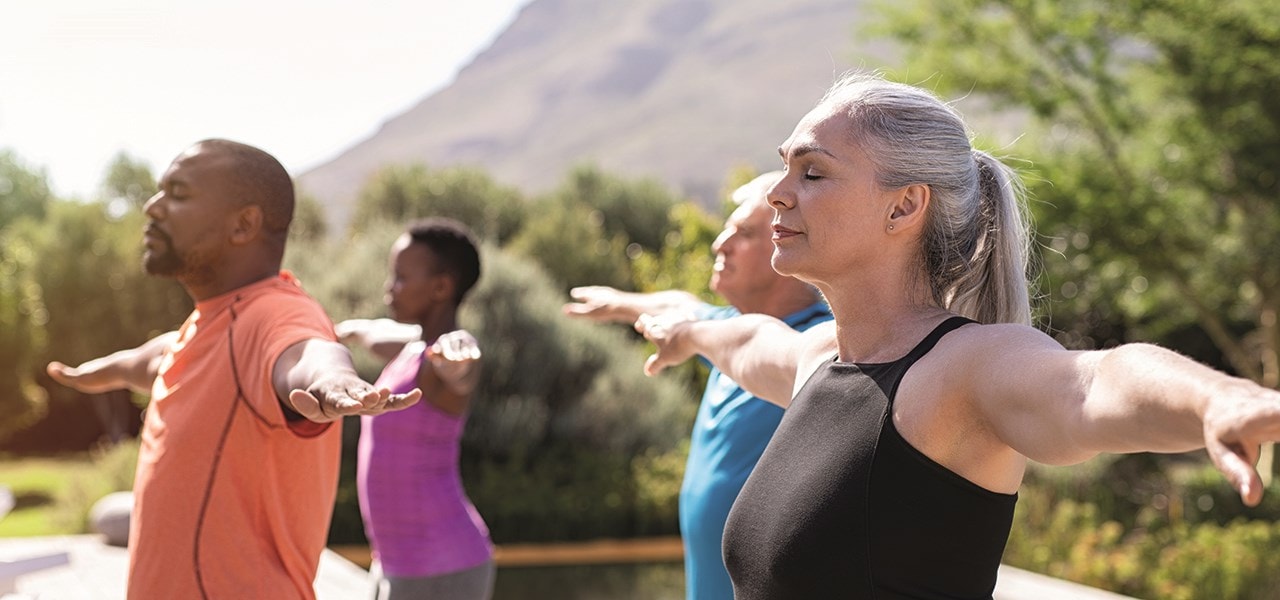Natural Menopause Support
Is menopause looming on the horizon, or are you already knee deep in hot flushes and mood swings? If so, you might be interested to know that there are some safe, natural choices which may help support your symptoms.
There is no doubt that for some women the menopause causes deep distress, both emotionally and physically. There is not a one-size-fits-all answer to how the menopause might affect you, but how could your experience differ if you had a greater understanding of the forthcoming biological changes? What if your menopause toolbox was full of sound nutritional advice, gut health guidance and lifestyle modifications to make the journey smoother?
Read on to find out how you can help yourself.
What is menopause?
The word menopause signifies the end of your monthly cycle. It is derived from the Greek words ‘men’ (mensis) meaning month and ‘pausis’ (cessation) meaning ‘stopping’. When your periods have been absent for 12 months, you have officially gone through the menopause. However, this transition for some women can be both physically and emotionally challenging, and the experience can last for several years as the body adjusts to new hormone levels.

What causes the menopause?
The ovaries have a built-in expiry date so the menopause is an inevitable part of life for all women. This transition generally happens between the ages of 45 and 55, with the average age of menopause in the UK being 511.
There are three different stages to the menopause, referred to as; perimenopause, menopause, and post-menopause.
Women are born with a finite number of eggs, which are stored in the ovaries. Oestrogen and progesterone are both produced by the ovaries and its these hormones that control your monthly cycle and ovulation. Once your body stops releasing eggs your ovaries reduce their hormone production significantly. Menopause occurs when your ovaries no longer release an egg every month and your periods stop as a result.
Hysterectomy
If you have had a hysterectomy this is likely to influence your menopause.
If your ovaries were removed during the procedure then this is referred to as a surgical, or induced menopause; your oestrogen levels will drop dramatically and you will likely experience symptoms straight after the procedure. As a result, younger women are given hormone replacement medication to top up the hormones that the ovaries would have naturally made.
If your ovaries were left behind, then they can still produce oestrogen naturally, but you are likely to experience the menopause within five years of having the operation2.
Which hormones to check?
As the ovaries ability to produce hormones (especially oestrogen) starts to decline, this triggers the levels of follicle-stimulating hormone (FSH) to rise. So when checking for menopausal status a GP may offer a test to measure this hormone.
However, guidelines in the UK suggest that FSH and oestradiol (a form of oestrogen) are only tested in those women below 45 with menopausal symptoms3. If you are older than 45, the chances are that your GP will likely diagnose where you are in the 'transition' based simply on your presenting symptoms.
Because symptoms during the menopause vary greatly, your GP may also test thyroid function, vitamin D levels, or additional relevant tests to rule out any other medical causes.
However, if you are concerned about any symptoms then you should always have a chat with your GP.
What are the common symptoms of the menopause?
Perimenopause is the first natural phase of menopause and it can begin 10 years prior to your last ever menstrual period, meaning that for some women it starts just after the age of 40.
During this time egg supplies start to run low, which means that oestrogen and progesterone levels start decreasing, and as a consequence, you may notice some uncomfortable symptoms, including:
- Changes to your monthly cycle
- You could become more forgetful
- You may start to experience the odd hot flush/flash
- Night sweats can occur
- Skin texture/tone may start to change
- Mood disorders such as anxiety can strike
- Some women experience weight gain
- Muscle and bone health can suffer due to lowered oestrogen
- Sleep problems are common
- Dizziness
- Palpitations
- Lowered libido
- Vaginal dryness
- Intimate health infections
Symptoms of the menopause vary greatly, depending on the individual. Some women cruise through with barely a sweat, whereas others may experience several of the symptoms listed.
As oestrogen production slowly comes to a halt, this may also have a more 'silent' impact on our body, especially on our heart and bones. Our risk of heart disease and stroke increases, whilst our bones may become weaker, leaving us with a greater risk of fractures.
No need to despair though! Be reassured that your diet, lifestyle, and natural supplements can have a great influence on your symptom severity, duration and quality of life.
5 Top Tips for Natural Menopause Support
Alongside nutrition, it is also important to maintain a healthy balanced lifestyle, which includes frequently spending time outside whilst managing stress levels. This will not only help boost your gut flora, but will also support overall hormone balance.
Here are 5 top tips to boost your health, before, during and after the menopause:
- Introduce yourself to phytoestrogens, these are foods that have naturally occurring oestrogen within them, so can go some way to help protect your bones from osteoporosis 4.
- Supporting your gut bacteria (microbiome) can also help. It will come as no surprise that, as we age, the diversity of our gut microbiome lessens. When you take a probiotic for your health, you are helping to support the populations of beneficial bacteria in your gut. This is really important, as good bacteria work with the body to support overall health and wellbeing. Probiotics have been shown to support mood, they help with weight management and metabolism, they can help balance vaginal flora and even optimise skin health5,6. Health practitioners can read more about probiotics for menopause in our Professional section: Which Probiotics are Best for Menopause?
- Choose foods that nourish and support your body. Think Mediterranean diet7, which is full of vegetables and leafy greens, fruits, nuts, whole grains, beans and legumes, olive oil and healthy fats, along with moderate amounts of seafood, poultry, eggs, herbs and spices, Consuming a diet naturally high in plant foods, healthy fats and lean proteins, whilst reducing refined sugar, is a great place to start.
- Exercise – cardio, strength and yoga – is important because it helps maintain muscle mass and strengthens bones, which lessens the risk of fractures and osteoporosis, exercise also helps maintain weight, boosts your mood and reduces the risk of heart disease and type 2 diabetes 8,9.
- Avoid caffeine and alcohol – these antinutrients will disrupt your hormones and may exacerbate hot flushes/flashes, night sweats and disrupt sleep10,11.
Your Natural Health Toolbox
Whether you are years away from menopause, just starting to feel the effects, or deep in the throes, you should now be feeling empowered and inspired to learn that there are so many safe and natural things you can do to help yourself. By nourishing your body with natural whole foods, exercising regularly to support muscle mass and bone health, and supporting your gut health with the right beneficial bacteria, you could actually be ‘future-proofing’ your health if you’ve yet to reach menopause, or giving yourself a boost if you are menopausal, to enable you to enjoy this stage of your life to the fullest.
If you enjoyed this article, you may also like:
Supplements for women: which do you really need?
Are all types of friendly bacteria the same?
Healthcare practitioners can head over to our Professionals site to read more about Which Probiotics are Best for Menopause?
References
- NHS. (2018). Menopause. Available: https://www.nhs.uk/conditions/menopause/. Last accessed 5/11/19.
- NHS. (2019). Hysterectomy. Available: https://www.nhs.uk/conditions/Hysterectomy/. Last accessed 18/15/19.
- National Institute for Care and Health Excellence. (2015). Menopause: diagnosis and management. Available: https://www.nice.org.uk/guidance/ng23/chapter/Recommendations#diagnosis-of-perimenopause-and-menopause. Last accessed 6/1/2020.
- A F Al-Anazi, V F Qureshi, K Javaid, S Qureshi. (2011). Preventive effects of phytoestrogens against postmenopausal osteoporosis as compared to the available therapeutic choices: An overview. Journal of Natural Science, Biology and Medicine. 2(2) (1), 154–163.
- H Tilg, A Kaser. (2011). Gut microbiome, obesity, and metabolic dysfunction. The Journal of Clinical Investigation. 121(6) (1), 2126–2132..
- R Brotman, M Shardell, P Gajer, D Fadrosh, K Chang, M. I. Silver, R. P. Viscidi, A. E. Burke, J Ravel, P. E. Gravitt. (2013). Association between the vaginal microbiota, menopause status, and signs of vulvovaginal atrophy. The North American Menopause Society. 21 (5), 450-458.
- Rheumatology Network Staff. (2018). Mediterranean Diet Benefits Bone Density and Muscle Mass After Menopause. Available:https://www.rheumatologynetwork.com/osteoporosis/mediterranean-diet-benefits-bone-density-and-muscle-mass-after-menopause. Last accessed 3/12/2019.
- M Jorgea, D Santaella, I Pontes, V Shiramizua, E Nascimentoa, A Cabral, T Lemos, R Silvac, A Riberio. (2016). Hatha Yoga practice decreases menopause symptoms and improves quality of life: A randomized controlled trial. Complementary Therapies in Medicine. 26 (0), 128–135.
- L Stojanovskaa, V Apostolopoulos a, R Polmanb, E Borkoles b. (2014). To exercise, or, not to exercise, during menopause and beyond. Maturitas. 77 (4), 318-323.
- Ebrahim, I. O., Shapiro, C. M., Williams, A. J., & Fenwick, P. B. (2013). Alcohol and Sleep I: Effects on Normal Sleep. Alcoholism: Clinical and Experimental Research, 37(4), 539`–549.
- Clark, I., & Landolt, H. P. (2017). Coffee, caffeine, and sleep: A systematic review of epidemiological studies and randomized controlled trials. Sleep Medicine Reviews, 31, 70–78.
Popular Articles
View all Women's Health articles-
Women's Health03 Mar 2025
-
Women's Health18 Apr 2024


